 |
| Ren Hang |
BIOGRAFÍAS
Ren Hang
(1987 - 2017)
The Art of Taboo: 任航(レン・ハン)- Ren Hang
 |
| Photo by Ren Hang |
Ren Hang (Chinese: 任航; March 30, 1987 – February 24, 2017) was a Chinese photographer and poet.
During Ren's incipient career, he was known mostly for nude photographic portraits of his friends. His work is significant for its representation of Chinese sexuality within a heavily censored society. For these erotic undertones, he was arrested by PRC authorities several times. He received the backing of the Chinese artist Ai Weiwei, who included Ren in his 2013 Netherlands show, Fuck Off 2 The Sequel, and curated the photographer's 2014 exhibition in Paris, France. Ren's erotic, playful and casual yet provocative expression gained him worldwide fame.
Early life
Ren was born in 1987, in a suburb of Changchun, Jilin province, in northeastern China.
In 2007, in order to relieve the boredom of studying advertising at college, he bought a point-and-shoot camera and began shooting his friends. As a self-taught photographer, he said his style of photography was inspired by the artist Shūji Terayama.
Death
Ren suffered from depression. He posted a series of diary entries titled "My depression" on his blog, recording the fear, anxiety and internal conflicts he experienced.
Ren died by suicide on February 24, 2017 in Beijing.
 |
| Photo by Ren Hang |
Works
Photography
Ren first began taking pictures of his roommates and friends in 2007, shooting them in the nude as all were close and seeking excitement. In an interview, he also admitted: “I usually shoot my friends, because strangers make me nervous.” He arranged his subjects' naked limbs in his photographs.
Ren did not consider his work inappropriate: “I don’t really view my work as taboo, because I don’t think so much in cultural context, or political context. I don’t intentionally push boundaries, I just do what I do.” This may account for his reticence to limit his work to indoor settings. He said there were no preferred places for him to work, as he believed anywhere was beautiful and worthy to be shot, including sparse studios, parks forests, and atop buildings. Ren's photos employ nude groups and solo portraits of men and women often contorted into highly performative positions. For example, hands reach down milky thighs, a limp penis flops onto a watermelon and a series of backsides imitate a mountain range.
Questioning the purpose of his work, he once stated that his creation was a way to seek fun for both photographer and the photographed. However, once he had reached fame on an international level, he began to think deeply about his work. The British Journal of Photography quoted him as once saying: "I don't want others having the impression that Chinese people are robots... Or they do have sexual genitals but always keep them as some secret treasures. I want to say that our cocks and pussies are not embarrassing at all." Ren also focused on marginalised people in Chinese society with gender identity disorders by 'indeterminating' sex and gender in some of his work: a group of naked bodies stacked together, men wearing silk stockings and wearing lipstick. He denied having a preference in models: “Gender… only matters to me when I’m having sex.” The international quarterly photography journal Aperture used his photo as the cover for its "Queer" theme. Commentators also see his work, the naked body and the starched penis, as evolving sexual mores and the struggle for creative and sexual freedom in a conservative, tightly controlled society. But Ren also announced "I don't try to get a message across, I don't give my works names, I don't date them. I don’t want to instill them with any vocabulary. I don't like to explain my photos or work as a whole".
It has been mentioned that Ren's work is softcore pornography because of the degree of nudity and sex in it, but he also worked with other themes. The most famous was titled “My Mum”. Although still under a fetishistic atmosphere, posing with usual props in Ren's works like animals and plants, Ren's mother posed as a clothed model, in a light-hearted way to represent her daily life. Ren's photographs have been included in magazines L'Officiel, GQ Style, and Vice. He worked with fashion companies Gucci, Rick Owens, and Loewe. Ren's work is included in Frank Ocean's magazine Boys Don't Cry.
Poetry
Throughout his life, he endured a long battle with depression, an experience he would often document on his website under a menu item titled My Depression. Here he recorded, sometimes in the form of poetry, his inner struggles against depression, including frequent hallucinations and hearing voices. In one poem, he wrote:
Style and controversies
Ren Hang is noted to be greatly influenced by Chinese and Asian contemporary art and in particular, Japanese photographer and contemporary artist Nobuyoshi Araki.
Ren Hang mainly worked with a simple point-and-shoot camera. He would direct the models as to how to place their bodies and shoot in quick succession. Genitalia, breasts and anuses were not covered up, but featured, or accentuated with props and close-ups. Colors were rich and high in contrast, increasing visual impact. This, along with the fact all bodies were slim, lithe and relatively hairless, made the impact of his photographs more impressive. His work communicated a raw, stark aesthetic that countered taboos and celebrated sexuality. Someone concluded it was this contemporary form of poeticism in a visual context in which Ren Hang expressed themes of identity, the body, love, loss and death.
Nudity is not a theme in art which can be widely accepted by the Chinese older generation. Ren Hang's works are sometimes misinterpreted by the public as pornography. Although some have written that Ren Hang used his photographs to challenge Chinese cultural norms of shame around nudity, he did not believe he was challenging the stereotype and leading a revolution. For him, nudity and sexuality are natural themes which he used in his work.
He said he was not trying to liberate nudity and sexuality since he believed that the Chinese young generation was open-minded and less affected by the old-fashioned cultures. When Ren Hang talked about the question whether the topic of sexuality was still a taboo in China, he said:
REN HANG | BEAUTY WITHOUT BEARDS
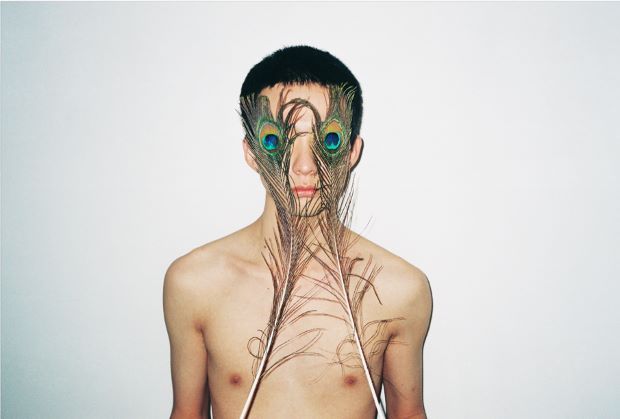
All images © Ren Hang, courtesy of Taschen
Controversial and renowned Chinese photographer Ren Hang dies aged 29
Published on 24 February 2017
Ren Hang, one of the leading lights of the new generation of Chinese photographers, despite enduring censorship and intimidation from the authorities throughout his career, has died at the age of 29, his gallerist has confirmed.
Ren Hang was arrested many times for his sexually explicit, joyously celebratory photography. Although he was globally renowned, he never gained the recognition he deserved in his home country, in part because he was repeatedly denied the opportunity to display his work in Beijing and throughout China.
Championed by Ai Wei Wei, and talked of as China’s answer to Ryan McGinley, Ren Hang’s photography was highly explicit, featuring nude group and solo portraits of men and women often contorted into highly performative positions. They were not models, but his friends, and increasingly, his fans, often shot in his tiny high-rise apartment. “I usually shoot my friends,” he once said. “Because strangers make me nervous.”
Ren Hang endured a long battle with depression throughout his life, an experience he would often document on his website, sometimes in the form of poetry, under a menu item titled My Depression.
One such entry from 16 July 2014, put through Google Translate, reads:
Life is indeed a
Precious gift
But I often feel
It seems to send the wrong man
Dries Roelens, who works for Ren Hang’s Belgian gallerist Stieglitz 19, confirmed the death today. He would have turned 30 next month.
Ren Hang was in the process of working on a major solo exhibition at Foam, Amsterdam, after receiving the Outset Exhibition Fund at Unseen Photography Festival last September.
Mirjam Kooiman, a curator at Amsterdam photography museum Foam, said to CNN of Ren Hang’s oeuvre at the time: “He makes the work in a context that isn’t free and open, so even though it’s not his intention to work against the grain, he cannot go around it completely. It is telling us something about not only him as an artist but also the generation he’s from.”
“There’s no hierarchy between the female and the male model in his work. It’s very telling about these tendencies of sexuality and queerness in Chinese society and how his generation is dealing with it,” Kooiman said. “It’s visual poetry. It’s without limits.”
Ren, his surname, given name Hang, was born March 30, 1987, in Nong’ An, a suburb of Changchun, capital of the northeastern province of Jilin, called the “Detroit of China” for its automotive industry.
Despite a deep affection for his hometown, he left for Beijing at 17 to study advertising.
He was a self-taught photographer, who bought a point-and-shoot camera and began shooting nude images of his friends as a way to “relieve boredom” while studying advertising in college.
He gained solo exhibitions in Antwerp, Athens, Bangkok, Copenhagen, Frankfurt, Hong Kong, Marseille, New York, Paris and Vienna, as well as gaining a hugely passionate organic following on platforms like Flickr, Facebook and Instagram.
He self-published seven monographs before Taschen recently published a retrospective photobook of his work, the first time an established, international publishing company had published his work.
Although he had exhibited in Beijing, and had been featured in the city’s independent magazines, he had a deeply complicated relationship with his home country.
On the times his photographs were shown to the public, it wasn’t unusual for his photos to be defaced at exhibitions or confiscated by officials. His websites were often mysteriously taken offline.
But Ren Hang was entirely disinterested in any sort of political or socially-conscious interception of his work.
“I don’t want others having the impression that Chinese people are robots with no cocks or pussies,” he told Dian Hanson, who edited the Taschen book. “Or they do have sexual genitals but always keep them as some secret treasures. I want to say that our cocks and pussies are not embarrassing at all.”
“What success means to me … I don’t know,” he told Hanson. “I wish that life can just go on. Smoothly.”
Pornographic images have been banned in the People’s Republic of China since 1949, but definitions are kept purposefully vague. But, as one of Ren Hang’s models said to Hanson, his photography helped to leaven a thirst “to break through the social taboo of nudity – for the sake of natural beauty.” May he rest in peace.

Portrait of Ren Hang
Ren Hang: Obituary
Ren Hang 任航 (1987-2017) was a poet and photographer born in Nong’ An, a suburb of Changchun, capital of the northeastern province of Jilin, called the “Detroit of China” for its automotive industry. At the age of seventeen, he left his hometown to settled down in Beijing to study marketing. His college work didn’t interest him so – in order to kill boredom - he bought himself a small Minolta point-and-shoot film camera and taught himself to use it.
Ren created several photographic series between 2008 and 2016, in concomitance with poems and free verses that we wrote between 2007 and 2017. Over the years, he gradually shifted from seemingly candid shots of individuals nudes to sexually-charged and explicit photographs, in which young naked bodies interlaced with one another in uncommon settings and complex compositions.

Ren was laconic when it came to discussing his works, which explains why he generally didn’t name them. With the exception of one series entitled “My Mum” (2014). Posing with the usual props in Ren’s works like animals and plants, the artist’s mother became another subject for his carefully staged and colourful images, while she retained her real-life identity in these fictionalised representations of her daily life. The rest of Ren series are populated with a mixture of his own male and female friends or people who approached him from the Internet.

"My Mum" series, 2014
His models posed naked, in impromptu choreographies, stacked like compression sculptures, often contorted in unnatural shapes. Their body parts were interlaced with flowers, hairs, and animals amongst other atypical props. Ren combined indoors, outdoors, natural and urban environments to create a playful raw vision of young people, regardless their gender. Tightly composed, his photographs were saturated and lit with stark flash. His goal was to “portray every organ in a fresh, vivid and emotional way.” Bright, lurid, blunt, the eroticism in Ren’s works is obvious. Yet they also convey a strong poetic and evocative force. “People come into this world naked and I consider naked bodies to be people’s original, authentic look,” Ren told vice magazine back in 2013. “I feel the real existence of people through their naked bodies.”
Ren’s works were and are still celebrated and censored in equal measure. Although he was disinterested in any sort of political or social commentary, he eventually embodied Chinese artists’ battle for creative freedom. In fact his works suffered from enduring censorship and intimidation from the Chinese authorities, who defaced or confiscated his works and even arrested him. The main cause: pornographic and nudity images have been banned in the People’s Republic of China since 1949. As he said: “I don’t really view my work as taboo, because I don’t think so much in cultural context, or political context. I don’t intentionally push boundaries, I just do what I do.”
Ren’s creativity was warmly welcomed in the Western World, especially in the arty and fashion circles. His first exhibition abroad happened in 2011, when Ai Weiwei invited him in the group show “Fuck Off 2” in Groninger Museum (Netherlands). In his brief career, he had to his credit over twenty solo, seventy group shows, several self-published monographs, and an official monograph by Taschen. Two solo exhibitions are currently running at the Foam Photography Museum in Amsterdam, and the Fotografiska Museum in Stockholm. He collaborated with the fashion brand Maison Kitsuné and published his photographs in Vice France Magazine, GQ style China Magazine, and TANK Magazine amongst many other. Today, Ren's works are collected by CAFA Art Museum and Three Shadows Photography Art Centre in China; Kansas State University Art Museum in USA; Multimedia Art Museum in Russia; and White Rabbit Collection in Australia.

Ren Hang's photograph for the fashion brand Maison Kitsuné
Ren endured a long battle with cyclical depression throughout his life. He turned to poetry to chronicle his battle with the disease, while having often foreshadowed his own death in postings on social media. "People suffering from depression may not exhibit any obvious symptoms, but if you find a friend down with depression, you need to spend more time with them and make the effort to call them more frequently, because you never know when it will strike," he wrote. "One minute I might be thinking the whole world is smiling at me, and the next, I might feel they all want to stab me." His struggle eventually led him to commit suicide on February 23rd 2017. He would have turned 30 in March. We will miss your outrageous poetry. Rest in peace Ren Hang.


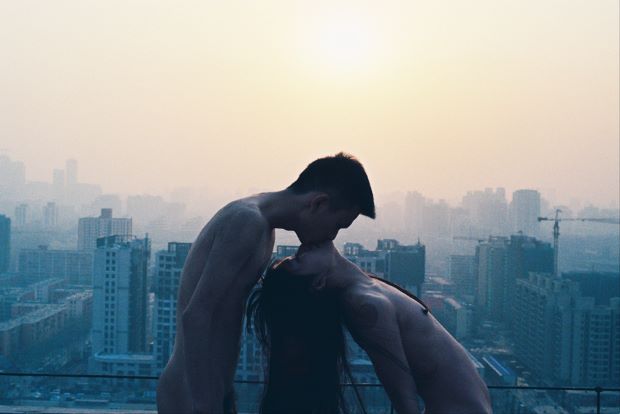
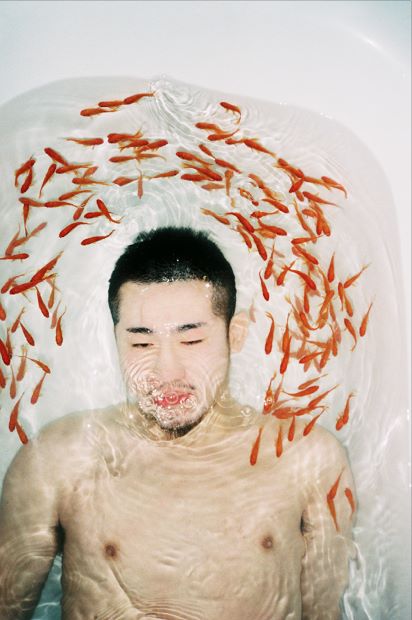
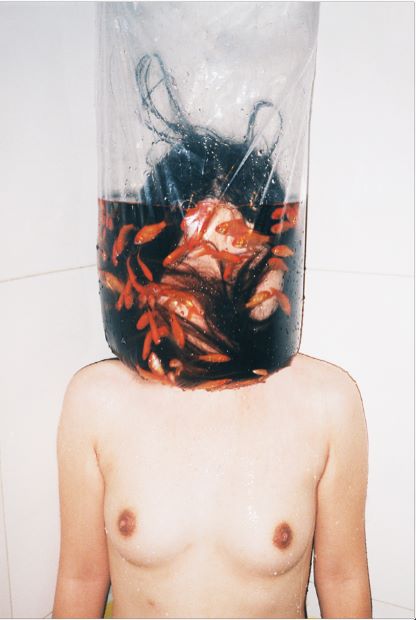
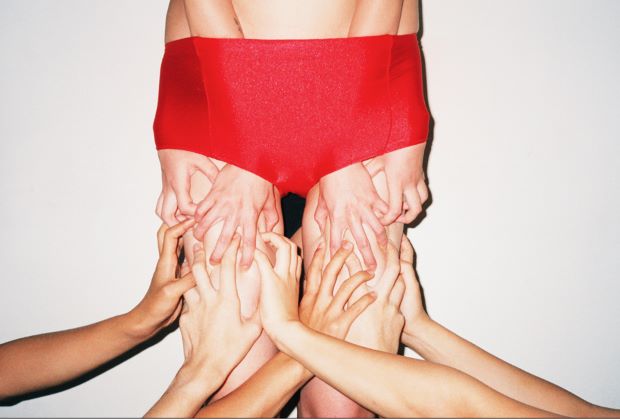
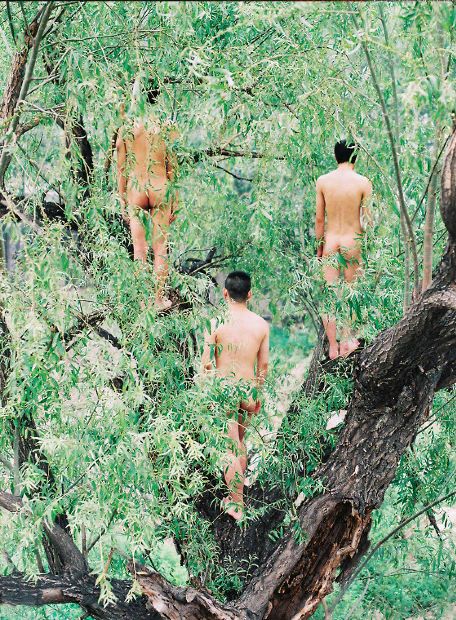



No hay comentarios:
Publicar un comentario